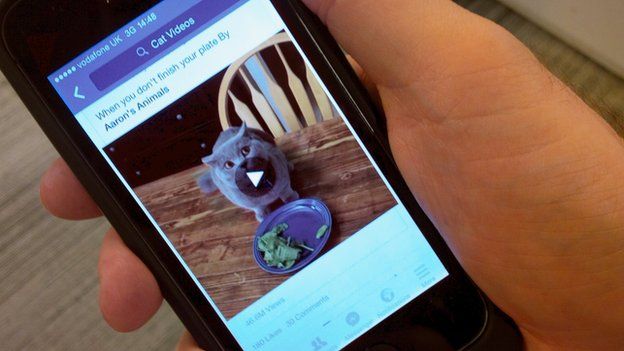Facebook to share advertising revenue with video creators
- Published

Facebook is to start paying some video creators for uploading their clips to the platform.
The company is launching a Suggested Videos feed that curates a sequence of clips, interspersed with adverts.
Videos that keep people watching for longer will earn a greater share of the revenue from these ads, with Facebook keeping 45% for itself.
Facebook says its users clock up four billion video views daily. One expert said it posed a threat to YouTube.
"Facebook is aggressively moving into the video space," said Eleni Marouli, advertising analyst at IHS consultancy.
"In December 2014, Facebook surpassed YouTube in views for the first time, and we predict YouTube will lose share from next year onwards."
In June, US broadcaster HBO announced it would stream some of its programmes on Facebook.
Offering a cash incentive could encourage more publishers to upload on the platform.
While YouTube gives content creators 55% of the revenue from ads displayed before their videos, Facebook will split the 55% it is offering between several creators.
"It's not an unusual, or generous model," said Ms Marouli. "But we could see a monetisation battle between Facebook and YouTube, to entice creators onto the platform."
Facebook made $3.3bn (£2.1bn) in ad revenue in the first quarter of 2015, 73% of it from mobile ads.
"Facebook is very adaptable," said Ms Marouli. "In 2012, they had zero mobile-ad revenue. In two years, they've raised that to over 60% of their ad income.
"Based on our forecasts, by 2018 Facebook will have 25% of online video ad revenue in Europe, and more in the US," said Ms Marouli.
What kind of video does well on Facebook?
Andrew Webb, duty editor of the BBC Shorts 15-second news video service, has these tips:
- Assume people cannot hear your videos. They often play automatically, without sound. Tell the story with on-screen text that explains what viewers are seeing
- If the video includes a sound bite, the text should summarise what is said, using some of the same words
- Do not put in too much detail. The BBC generally runs three sentences, up to three lines long, over 12 seconds
- Find out how different apps crop thumbnail images and where they superimpose play buttons and icons. Design text and images that fit - even though this can be a real headache
- Using music can add pace to a video, but make sure you have the rights
Facebook says it is testing the Suggested Videos feed for iPhone users in the US and that the revenue-sharing arrangement will not begin immediately.
While YouTube allows most users to monetise their videos, Facebook says it is working with a group of media companies and chosen individuals for the time being.
One likely concern for video creators is that it is more difficult to search for videos on Facebook than YouTube at the moment.
But Ms Marouli said money might still be a deciding factor.
"The big players don't need tech companies like Facebook and YouTube to get their content out," she told the BBC.
"If they aren't happy with the deal on offer, they could pull out completely, like Channel 4 did with YouTube."
- Published29 June 2015
- Published13 January 2015
- Published16 March 2015